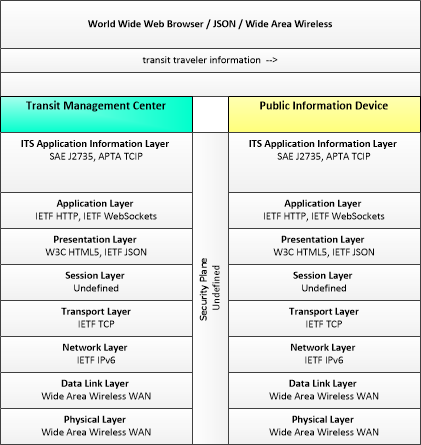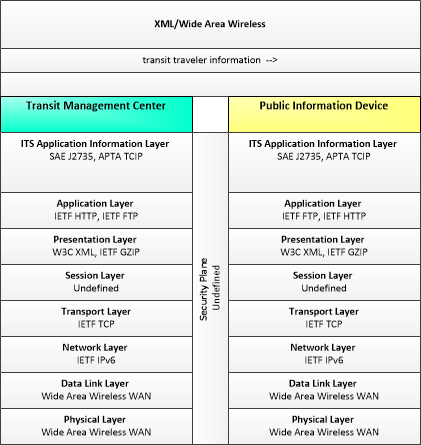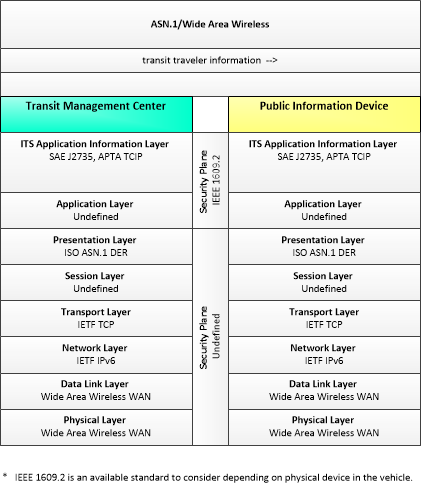Link Type: Wide-Area Wireless
Transit Management Center --> Public Information Device:
transit traveler information
Definitions
transit traveler information (Information Flow): Transit information prepared to support transit users and other travelers. It contains transit schedules, real-time arrival information, fare schedules, alerts and advisories, and general transit service information.
Transit Management Center (Source Physical Object): The 'Transit Management Center' manages transit vehicle fleets and coordinates with other modes and transportation services. It provides operations, maintenance, customer information, planning and management functions for the transit property. It spans distinct central dispatch and garage management systems and supports the spectrum of fixed route, flexible route, paratransit services, transit rail, and bus rapid transit (BRT) service. The physical object's interfaces allow for communication between transit departments and with other operating entities such as emergency response services and traffic management systems.
Public Information Device (Destination Physical Object): The Public Information Device provides access to traveler information at transit stations, transit stops, other fixed sites along travel routes (e.g., rest stops, merchant locations), and major trip generation locations such as special event centers, hotels, office complexes, amusement parks, and theaters. Traveler information access points include kiosks and informational displays supporting varied levels of interaction and information access. At transit stops this might be simple displays providing schedule information and imminent arrival signals. This may be extended to include multi-modal information including traffic conditions and transit schedules to support mode and route selection at major trip generation sites. Personalized route planning and route guidance information can also be provided based on criteria supplied by the traveler. It also supports service enrollment and electronic payment of transit fares.
In addition to the traveler information provision, the Public Information Device also supports security and safety monitoring of public areas. This monitoring includes traveler activated silent alarms, as well as surveillance and sensor equipment. The surveillance equipment includes video (e.g. CCTV cameras) and/or audio systems. The sensor equipment includes threat sensors (e.g. chemical agent, toxic industrial chemical, biological, explosives, and radiological sensors) and object detection sensors (e.g. metal detectors).
Included In
This Information Flow is in the following Applications:
This Information Flow is in the following Application Objects:
Communication Diagrams
The communication diagram(s) can be viewed in SVG or PNG format and the current format is SVG. Switch to PNG format.
This profile describes applicable XML and W3C web services standards used in transmissions over wide area wireless communications.
This profile describes applicable ASN.1 standards used in transmissions over wide area wireless communications.
Characteristics
Architectural:
| Characteristic | Value |
|---|---|
| Time Context | Recent |
| Spatial Context | Local |
| Acknowledgement | False |
| Cardinality | Unicast |
| Initiator | Destination |
Security
This information flow triple is in the following applications with the following security levels.
| Information Flow Security | |||||
|---|---|---|---|---|---|
| Application | Confidentiality | Integrity | Availability | ||
| Basis | Basis | Basis | |||
| Security levels have not been defined yet. | |||||


